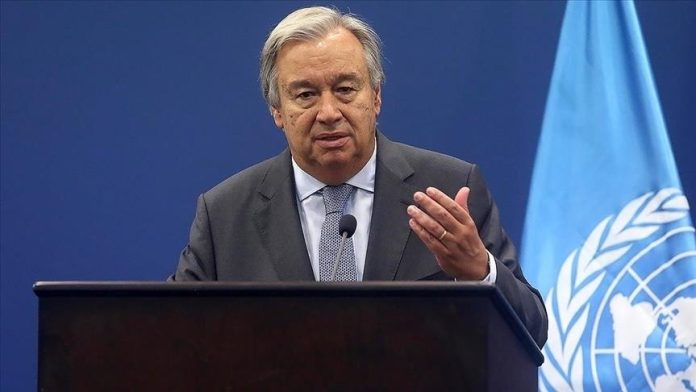UN head Antonio Guterres warned Monday that a misunderstanding could spark nuclear destruction as the United States, Britain and France urged Russia to stop “its dangerous nuclear rhetoric and behaviour.”
At the opening of a key nuclear Non-Proliferation Treaty (NPT) conference in New York, Guterres warned that the world faced “a nuclear danger not seen since the height of the Cold War.”
Citing Russia’s war with Ukraine and tensions on the Korean peninsula and in the Middle East, Guterres said he feared that crises “with nuclear undertones” could escalate.
“Today, humanity is just one misunderstanding, one miscalculation away from nuclear annihilation,” Guterres told the 10th review conference of the NPT, an international treaty that came into force in 1970 to prevent the spread of nuclear weapons.
“We have been extraordinarily lucky so far. But luck is not a strategy. Nor is it a shield from geopolitical tensions boiling over into nuclear conflict,” he added, calling on nations to “put humanity on a new path towards a world free of nuclear weapons.”
The meeting, held at the UN’s headquarters in New York, has been postponed several times since 2020 due to the Covid-19 pandemic. It will run until 26 August.
Guterres said the conference was “a chance to strengthen” the treaty and “make it fit for the worrying world around us.
“Eliminating nuclear weapons is the only guarantee they will never be used,” the secretary-general implored, adding that he would visit Hiroshima for the anniversary of the 06 August, 1945 atomic bombing of the Japanese city by the United States.
“Almost 13,000 nuclear weapons are now being held in arsenals around the world. All this at a time when the risks of proliferation are growing and guardrails to prevent escalation are weakening,” Guterres added.
In January, the five permanent members of the UN Security Council — the United States, China, Russia, Britain and France — had pledged to prevent the further dissemination of nuclear weapons.
On Monday, America, Britain and France reaffirmed their commitment in a joint statement, saying a “nuclear war cannot be won and must never be fought.”
The three also took aim at Russia, urging Moscow to respect its international commitments under the NPT.
“Following Russia’s unprovoked and unlawful war of aggression against Ukraine, we call on Russia to cease its irresponsible and dangerous nuclear rhetoric and behaviour,” they said.
The statement came as U.S President Joe Biden called on Russia and China to enter nuclear arms control talks.
The U.S leader reiterated in a statement that his administration is ready to “expeditiously negotiate” a replacement to New START, the treaty capping intercontinental nuclear forces in the United States and Russia, which is set to expire in 2026.
The NPT, which the signatories review every five years, aims to prevent the spread of nuclear weapons, promote complete disarmament and promote cooperation in the peaceful use of nuclear energy.
At the last review conference in 2015, the parties were unable to reach agreement on substantive issues.
“The world can never be safe as long as any country has nuclear weapons,” said Beatrice Fihn, executive director of the International Campaign to Abolish Nuclear Weapons, who was in New York for the meeting.
“And the NPT recognises this,” she added. “It’s the reason that the treaty exists. And now states, parties more than ever need to act.” Fihn said.
Meanwhile, Russian President Vladimir Putin said on Monday there could be no winners in a nuclear war and no such war should ever be started.
The Kremlin leader made the comment in a letter to participants of a conference on the nuclear non-proliferation treaty (NPT), more than five months into his war on Ukraine.
“We proceed from the fact that there can be no winners in a nuclear war and it should never be unleashed, and we stand for equal and indivisible security for all members of the world community,” he said.
His words to the NPT forum appeared aimed at striking a reassuring note and portraying Russia as a responsible nuclear power.
They contrasted with earlier statements by Putin and other Russian politicians that have been interpreted in the West as implicit nuclear threats.
In a speech on 24 February, as he launched the Russian invasion of Ukraine, Putin pointedly referred to Russia’s nuclear arsenal and warned outside powers that any attempt to interfere would “lead you to such consequences that you have never encountered in your history”.
Days later, he ordered Russia’s nuclear forces to be put on high alert.
The war has raised geopolitical tensions to levels not seen since the 1962 Cuban Missile Crisis, with politicians in both Russia and the United States speaking publicly of the risk of World War Three.
CIA director William Burns said in April that given the setbacks Russia had suffered in Ukraine, “none of us can take lightly the threat posed by a potential resort to tactical nuclear weapons or low-yield nuclear weapons.”
Russia, whose military doctrine allows for the use of nuclear weapons in the event of an existential threat to the Russian state, has accused the West of waging a “proxy war” against it by arming Ukraine and imposing sanctions on Moscow.
Earlier on Monday, a Russian foreign ministry source questioned the seriousness of comments by U.S. President Joe Biden calling for talks on a nuclear arms control framework to replace a treaty expiring in 2026.
In April, Russia conducted a first test launch of its new Sarmat intercontinental ballistic missile, capable of mounting nuclear strikes against the United States, and said it planned to deploy the weapons by autumn.
SOURCE: AFR/REUTERS/PACNEWS














